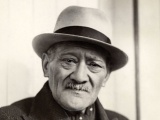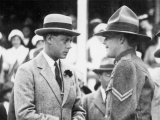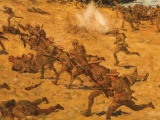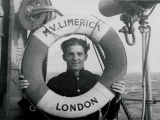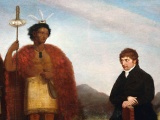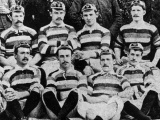Historic NZ events in November
Nov
1898 Old-age Pensions Act becomes law
A world first, the act gave a small means-tested pension to elderly men and women with few assets who were ‘of good moral character’ and were leading a ‘sober and reputable life’. It was one of the major achievements of Richard Seddon’s Liberal government.
Read more...1944 Polish refugees land in New Zealand
Over 800 Polish refugees seeking safety from war-torn Europe disembarked in Wellington. For the 733 children and 102 adults it was the end of a long and perilous journey.
Read more...Nov
1868 New Zealand becomes first country to adopt a standard time
On 2 November 1868, New Zealand discarded its numerous local times and became the first country to regulate its time in relation to Greenwich mean time (GMT).
Read more...1942 2 New Zealand Division leads breakthrough at El Alamein
At El Alamein in Egypt, 2 New Zealand Division opened the way for British tanks, allowing the Allies to make a breakthrough and force the Axis forces in North Africa to retreat.
Read more...Nov
1863 Naval attack on Pūkorokoro, Firth of Thames
During the first phase of the Waikato War, the colonial government sent HMS Miranda, a screw corvette (steamship), and the gunboat HMS Sandfly to blockade the Firth of Thames. Read more...
1886 Manawatū rail link opened
Built by the privately owned Wellington and Manawatu Railway Company (WMR), the line helped open the Kāpiti Coast, Horowhenua and Manawatū to European settlement.
Read more...1886 Birth of Anchor butter
From a dairy factory at Pukekura, Waikato, Henry Reynolds launched Anchor butter. The brand name, allegedly inspired by a tattoo on the arm of one of his workers, would become one of this country’s best-known trademarks.
Read more...1974 'Summer time' reintroduced on trial basis
The trial proved popular with most New Zealanders and daylight saving of one hour between October and March was made permanent in 1975.
Read more...Nov
1918 New Zealand Division liberates Le Quesnoy
By early November 1918 Germany stood alone against the Allies and revolution was breaking out behind the lines. But the German army was still resisting on the Western Front, and the New Zealanders’ capture of the walled northern French town of Le Quesnoy was a bold feat of arms.
Read more...1930 Phar Lap wins the Melbourne Cup
Ridden by Jimmy Pike, the New Zealand-bred (but Australian-owned) wonder-horse beat Second Wind by two lengths to claim one of his greatest victories.
Read more...Nov
1881 Invasion of pacifist settlement at Parihaka
About 1600 troops invaded the western Taranaki settlement of Parihaka, which had come to symbolise peaceful resistance to the confiscation of Māori land.
Read more...1913 Battle of Featherston Street
The ‘Battle of Featherston Street’, in downtown Wellington, saw some of the most violent street fighting of the 1913 Great Strike.
Read more...Nov
1908 Last spike completes North Island main trunk railway
Prime Minister Sir Joseph Ward ceremonially opened the North Island main trunk railway line by driving home a final polished silver spike at Manganuioteao, between National Park and Ohākune.
Read more...Nov
1848 The Acheron arrives to survey New Zealand waters
Captained by John Lort Stokes, the paddle steamer Acheron spent four years charting the New Zealand coastline.
Read more...1912 Public Service Act passed into law
The Public Service Act was passed into law, creating a framework for New Zealand’s bureaucracy that was to endure until 1988. The Act was the brainchild of lawyer Alexander Herdman, a senior minister in the new Reform Party government.
Read more...1970 Last unclimbed face of Aoraki/Mt Cook conquered
Long-haired Christchurch mountaineers John Glasgow and Peter Gough became the first people known to have scaled the 2000-m Caroline Face of Aoraki/Mt Cook. They declared it a ‘triumph for the hippies’.
Read more...Nov
1936 New Zealanders march into besieged Madrid
Griff Maclaurin and Steve Yates were part of the International Column of anti-fascist volunteers which marched into Madrid to bolster the city's defences against the assault of General Francisco Franco's rebel armies. Both men were killed in battle within two days of arriving
Read more...1939 New Zealand Centennial Exhibition opens
More than 2.6 million people visited the New Zealand Centennial Exhibition, which ran for six months at Rongotai, Wellington. It was the centrepiece of the centennial of the signing of the Treaty of the Waitangi.
Read more...Nov
1920 White New Zealand policy introduced
The Immigration Restriction Amendment Act 1920 required intending immigrants to apply for a permanent residence permit before they arrived in New Zealand.
Read more...1769 Cook observes transit of Mercury
James Cook helped his astronomer Charles Green observe the transit of Mercury at Te Whanganui-o-Hei (Mercury Bay), Coromandel Peninsula.
Read more...Nov
1868 Te Kooti attacks Matawhero
The Matawhero ‘massacre’ was Te Kooti’s utu (revenge) for his 1866 exile to the Chatham Islands, and subsequent events.
Read more...1871 Telegraph Department cleared of 'hacking' charges
Events in 1870-71 led Otago Daily Times editor George Barton to claim in his newspaper that the government had been intercepting telegraphs for political gain.
Read more...1880 Sutherland Falls 'discovered'
The renowned backwoodsman Donald Sutherland 'discovered' the waterfall that bears his name near what is now the Milford Track – New Zealand’s best-known walking track.
Read more...Nov
1918 Armistice Day
The 11th hour of the 11th day of the 11th month was the moment when hostilities ceased on the Western Front in 1918, following the signing of an armistice.
Read more...1942 Troopship Awatea goes down fighting
The Union Steam Ship Company of New Zealand’s sleek 13,482-ton trans-Tasman liner Awatea, launched in 1936, was one of the finest and fastest ships of its size in the world at the outbreak of the Second World War.
Read more...1978 Andy Haden dives to save rugby test
With two minutes to play in a rugby test match against Wales, All Black lock Andy Haden flung himself sideways in an attempt to secure a match-winning penalty.
Read more...Nov
1912 Striker fatally wounded at Waihī
Striking worker Fred Evans was badly injured in the Bay of Plenty goldmining town of Waihī. He died next day.
Read more...Nov
1896 Mount Tongariro erupts
At 12.40 p.m. on 13 November 1896, Te Maari, a crater at the northern end of the Tongariro range, erupted spectacularly. It continued to erupt sporadically for nearly a year.
Read more...1990 Thirteen shot dead at Aramoana
The small seaside township of Aramoana, near Dunedin, was the scene of what was then the deadliest mass murder in New Zealand history.
Read more...Nov
1973 DPB legislation enacted
The passage of the Social Security Amendment Act introduced the domestic purposes benefit (DPB) to New Zealand’s social welfare system.
Read more...Nov
1861 First issue of Otago Daily Times published
Dunedin became the first New Zealand town with a daily newspaper when the first issue of the Otago Daily Times was published.
Read more...Nov
1840 New Zealand officially becomes British colony
New Zealand became a separate colony within the British Empire. North, South and Stewart islands were to be known respectively as the provinces of New Ulster, New Munster and New Leinster.
Read more...1869 Hamiora Pere executed for treason
Hamiora Pere was hanged at the Terrace Gaol, Wellington. He is the only New Zealander to have been executed after being convicted of treason.
Read more...1916 First conscription ballot
The Military Service Act passed on 1 August 1916 had made all healthy New Zealand men of military age (20 to 45) liable for active service overseas.
Read more...Nov
1925 New Zealand and South Seas International Exhibition opens
Governor-General Sir Charles Fergusson opened Dunedin’s New Zealand and South Seas International Exhibition in November 1925.
Read more...Nov
1874 Cospatrick fire kills 470
En route to Auckland laden with immigrants, the Cospatrick caught fire off the Cape of Good Hope. The tragedy has been described as New Zealand's worst civil disaster.
Read more...1947 41 die in Ballantynes fire
The fire in Christchurch’s prestigious department store was the deadliest in New Zealand’s history.
Read more...Nov
2010 Pike River mine explosion kills 29
The mine exploded at 3.44 p.m. on Friday 19 November 2010. Twenty-nine of the 31 men underground died immediately or soon afterwards from the blast or because of the toxic atmosphere this generated.
Read more...Nov
1841 Mass murder in the Bay of Islands
Maketū Wharetōtara, the 17-year-old son of the Ngāpuhi chief Ruhe, killed five people at Motuarohia in the Bay of Islands. In March 1842 he became the first person to be legally executed in this country.
Read more...1937 Parachuting Santa crashes in Auckland
George Sellars narrowly escaped serious injury when he was able to swing his parachute away from the glass roof of the Winter Gardens during the Farmers’ Christmas parade in Auckland.
Read more...Nov
1863 British capture Rangiriri
More British soldiers and sailors were killed at ‘Bloody Rangiriri’ than in any other battle of the New Zealand Wars, but their eventual hard-fought victory opened the Waikato basin to the advancing imperial forces.
Read more...Nov
1939 Freyberg given command of 2NZEF
British-born but New Zealand-raised, Lieutenant-General Sir Bernard Freyberg was a charismatic and popular military leader who later served as governor-general.
Read more...Nov
1918 Influenza pandemic reaches peak mortality
No other event has killed so many New Zealanders in such a short time as the 1918 influenza pandemic.
Read more...1941 25 Battalion suffers heavy casualties at Point 175
The attack was part of Operation Crusader, an ambitious attempt by the British Eighth Army to both recapture Tobruk and destroy General Erwin Rommel’s elite Afrika Korps.
Read more...1947 Civic funeral for 41 Ballantynes fire victims
On 18 November 1947 Ballantynes, a Christchurch department store that was a local institution, was razed by the deadliest fires in New Zealand history. The bodies of the 41 victims were buried at Ruru Lawn Cemetery, Bromley, after a civic funeral five days later.
Read more...1986 Pope John Paul II celebrates Mass in windy Wellington
The first and so far only visit to New Zealand by a Bishop of Rome was significant for both Catholics and the wider community.
Read more...Nov
1959 Fifteen die in mysterious shipwreck
All hands were lost when the modern coastal freighter Holmglen foundered off the South Canterbury coast. The cause of the tragedy was never established.
Read more...Nov
1903 Bob Fitzsimmons wins third world boxing title
By winning the light-heavyweight championship, Timaru boxer Bob Fitzsimmons became the first man to have won world professional boxing titles in three weight divisions.
Read more...Nov
1960 'Kiwi Keith' begins 12-year tenure as prime minister
Keith Holyoake led the National Party to victory over Walter Nash’s Labour government. He went on to become New Zealand’s third longest-serving prime minister, behind Richard Seddon and William Massey.
Read more...Nov
1849 Death of Te Rauparaha
The formidable Ngāti Toa leader had dominated Te Moana-o-Raukawa - the Cook Strait region - from his base at Kāpiti Island for nearly 20 years.
Read more...1935 Labour wins power
The 1935 general election has long been seen a defining moment in New Zealand history. Undermined by its failure to cope with the distress of the Depression, the Coalition (‘National’) government was routed by the Labour Party, led by Michael Joseph Savage.
Read more...1940 Liner sunk off East Cape
The 16,712-ton New Zealand Shipping Company liner Rangitane was intercepted and sunk 550 km off East Cape, with the loss of 15 lives.
Read more...Nov
1893 Women vote in first general election
New Zealand women went to the polls for the first time, just 10 weeks after the governor signed the Electoral Act 1893, making this country the first in in which women had the right to vote in parliamentary elections.
Read more...1953 New Zealand's first family planning clinic opens
New Zealand’s first family planning clinic opened above a garage in Remuera, Auckland.
Read more...1979 257 killed on Mt Erebus
On the morning of 28 November 1979, Air New Zealand Flight TE901 left Auckland for an 11-hour return sightseeing flight to Antarctica. At 12.49 p.m. (New Zealand Standard Time), the aircraft crashed into the lower slopes of Mt Erebus, killing all 257 passengers and crew.
Read more...2008 Air New Zealand A320 crashes in France
An Air NZ Airbus A320 crashed off the coast of France. All seven people on board, including five New Zealanders, were killed. It was 29 years to the day since Air NZ Flight TE901 had crashed in Antarctica, killing all 257 on board
Read more...Nov
1877 Education Act passed into law
The Education Act 1877 established free, compulsory and secular education for all Pākehā New Zealand children. Māori children could attend these schools if their parents wanted them to.
Read more...1949 First female Māori MP elected
Iriaka Rātana was elected as New Zealand’s first female Māori MP.
Read more...1893 First woman mayor in British Empire elected
By becoming mayor of Onehunga, Auckland, Elizabeth Yates struck another blow for women’s rights in local-body polls held the day after the first general election in which women could vote.
Read more...Nov
1949 Election of first National government
The Labour government led by Peter Fraser was defeated by Sidney Holland’s National Party after 14 years in office. The result heralded a long period of National dominance, with the party holding power for 29 of the next 35 years.
Read more...




























































